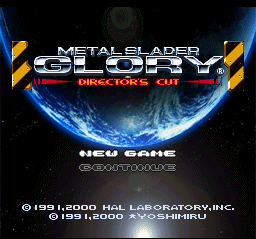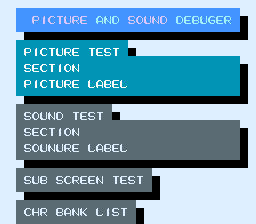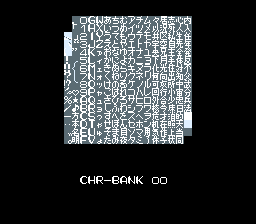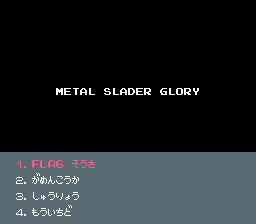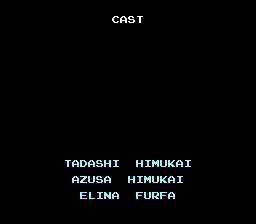Metal Slader Glory: Director's Cut
| Metal Slader Glory: Director's Cut |
|---|
|
Developer: HAL Laboratory[1]
|
Metal Slader Glory: Director's Cut is an updated version of the Famicom cult classic, released exclusively through the Nintendo Power service. Aside from updated audiovisuals and new scenarios originally cut for space, the game plays mostly the same as its Famicom counterpart; it even ports over the Famicom version's engine and code.
Notably, this was the last official game for the Super Famicom, and a far better note to go out on than how the SNES ended in the US two years earlier.
Contents
Sub-Pages
| Prerelease Info |
| Notes |
| Bugs |
Debug Mode
| Please elaborate. Having more detail is always a good thing. |
Just like the Famicom version, the Super Famicom version has a debug mode. To access it, enter でばっぐ やろう★ (appropriately, "Let's debug") on the password screen. However, the game will jump to Chapter 2. To enable the debug menu, simply change 0x140423 from $3F to $50. The debug mode, although similar to the Famicom version, is more sophisticated.
Stage Selection
| Original | Director's Cut |
|---|---|
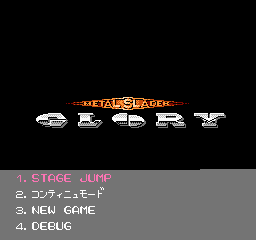 |
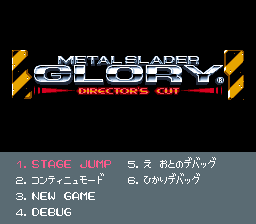 |
This menu is more less the same as the Famicom version, but has more options. For example, Stage 1 has two extra options: option 5 leads to the CG and sound debugger and option 6 leads to a menu to preview various cutscenes.
Picture and Sound Debuger[sic]
This screen is not present in the Famicom version.
Picture Test
This is a scene and cutscene viewer where everything is listed under a category in the CG and sound debugger.
Sound Test
This does what you'd expect, and like the "picture test", everything is listed under a category. A lot of song and sound effects are listed by bank, and for these categories you can toggle through the different subtunes. There's a lot of categories dedicated to sound effect types. There's one category for just background music and it lets you toggle through all the music in the game. All the songs are ordered by song ID in this category.
Subscreen Test
This is a separate screen that lets you debug different character portraits.
CHR Bank List
The Super Famicom doesn't use CHR banks, which the Famicom did so the text here is misleading. In fact, it's very likely this is a holdover from the Famicom version. In any case, in Director's Cut, this previews compressed graphics by reading from a specific pointer table. Each "bank" is really an index from this pointer table. Additionally, it also doesn't let you preview all the graphics from the game.
Unused Graphics
The scenes unused in the Famicom version are also unused in Director's Cut.
Unused Scenes
Copyright Screen
- Name: COPY RIGHT
The copyright screen from the Famicom version is unused here. The director's cut version instead has multiple copyright screens that feature 8bpp graphics.
Credits
- Name: スタッフクレジット
An unused credit sequence. It matches the aesthetic of the Famicom original. This unused credit sequence has sections for both the Famicom and Super Famicom versions; the one used in the final game excludes the former. The Super Famicom credits lack any mention of Live Planning as they were only responsible for music.[2][3]
CHR Bank 0A
| Original | Director's Cut |
|---|---|
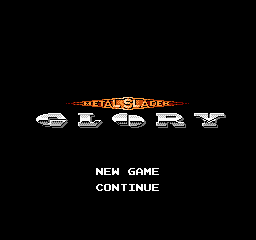 |
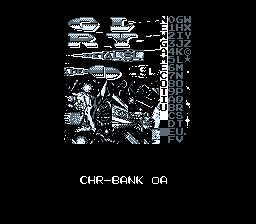 |
The Famicom version's title screen graphics exist in this version.
Music
Missing Songs
The debug menu's sound test contains multiple references to missing songs under the "BGM" option. The track names are formatted like the other background music with generic names such as "M45-1". M likely stands for "music" and the number after it identifies the song. After the number is another number. Songs with the same identifier are related to another. For example, M55-1, M55-2, M55-3, and M55-4 are all related to the final battle.
| ID | Song Name | Comment |
|---|---|---|
| 01 | M1 | "M1 2" is the background music for the restaurant Vivace. The Famicom version's NSF contain multiple entries for this song at varied volume. |
| 03 | M1 3 | |
| 04 | M1 4 | |
| 1D | M45-1 | "M45" and "M45-2" are alien encounter-related. |
| 1F | M45-3 | |
| 20 | M51 | "M51-1" is final battle-related. |
| 2D | M56 | The tracks surrounding this, "M60" and "M55-4", are final battle-related. |
M-ETC (ID: F8)
File:Metal Slader Glory DX-F8 Miscellanous Music.ogg
An unused song with a generic name. Songs close to FF deviate from the standard naming convention, aren't located with the other songs, and have their own dedicated bank.
M67 (ID: 39)
In the game's sound debugger, an unused sound bank entry for "Opening 2" exists containing unused music and sound effects. Judging by the names of the sound effects and bank, this is an unused battle scenario between the aliens and Glory. It's possible this is original alien war the game constantly references. The game doesn't contain other unused assets alluding to this scrapped opening cutscene.
Development Text
Bank Names
ASCII labels can be found at the top of three of the ROM banks. "EXE" likely refers to the fact that the bulk of the game's executable program code is present in the first bank.
| Address | File Name |
|---|---|
| 0x00000 | ProjectBank.EXE. |
| 0x08000 | ProjectBank.01.. |
| 0x10000 | ProjectBank.02.. |
Build Info
Present at 0x4580. Apparently, the final version was compiled on April 17, 2000. The game saw release on pre-written flash cartridges.
SFC GLORY
Version2.00
2000/04/17
Unused Namecards
| To do: Confirm whether or not each one are unused here as well. |
While the Super Famicom version has an expanded script, some namecards that are unused in the Famicom version are unused in this version as well.
References
- Games developed by HAL Laboratory
- Games published by HAL Laboratory
- SNES games
- Pages missing date references
- Games released in 2000
- Games released in November
- Games released on November 29
- Games with unused graphics
- Games with unused text
- Games with debugging functions
- Pages with a Data Crystal link
- Articles requiring elaboration
- Pages with broken file links
- To do
Cleanup > Articles requiring elaboration
Cleanup > Pages missing date references
Cleanup > Pages with broken file links
Cleanup > To do
Games > Games by content > Games with debugging functions
Games > Games by content > Games with unused graphics
Games > Games by content > Games with unused text
Games > Games by content > Pages with a Data Crystal link
Games > Games by developer > Games developed by HAL Laboratory
Games > Games by platform > SNES games
Games > Games by publisher > Games published by HAL Laboratory
Games > Games by release date > Games released in 2000
Games > Games by release date > Games released in November
Games > Games by release date > Games released in November > Games released on November 29
